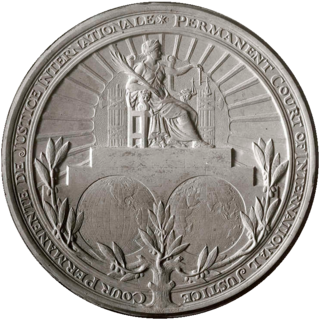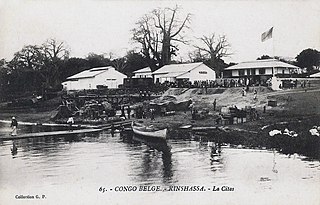Related Research Articles

The International Court of Justice, or colloquially the World Court, is the only international court that adjudicates general disputes between nations, and gives advisory opinions on international legal issues. It is one of the six organs of the United Nations (UN), and is located in The Hague, Netherlands.
Jurisdiction is the legal term for the legal authority granted to a legal entity to enact justice. In federations like the United States, the concept of jurisdiction applies at multiple levels.

The Permanent Court of International Justice, often called the World Court, existed from 1922 to 1946. It was an international court attached to the League of Nations. Created in 1920, the court was initially well-received from states and academics alike, with many cases submitted to it for its first decade of operation.
McDonald's Corporation v Steel & Morris[1997] EWHC 366 (QB), known as "the McLibel case", was an English lawsuit for libel filed by McDonald's Corporation against environmental activists Helen Steel and David Morris over a factsheet critical of the company. Each of two hearings in English courts found some of the leaflet's contested claims to be libellous and others to be true.
Universal jurisdiction is a legal principle that allows states or international organizations to prosecute individuals for serious crimes, such as genocide, war crimes, and crimes against humanity, regardless of where the crime was committed and irrespective of the accused's nationality or residence. Rooted in the belief that certain offenses are so heinous that they threaten the international community as a whole, universal jurisdiction holds that such acts are beyond the scope of any single nation's laws. Instead, these crimes are considered to violate norms owed to the global community and fundamental principles of international law, making them prosecutable in any court that invokes this principle.

The Belgian Congo was a Belgian colony in Central Africa from 1908 until independence in 1960 and became the Republic of the Congo (Léopoldville). The former colony adopted its present name, the Democratic Republic of the Congo (DRC), in 1964.

The European Court of Justice (ECJ), formally just the Court of Justice, is the supreme court of the European Union in matters of European Union law. As a part of the Court of Justice of the European Union, it is tasked with interpreting EU law and ensuring its uniform application across all EU member states under Article 263 of the Treaty of the Functioning of the European Union (TFEU).

The Congo Free State, also known as the Independent State of the Congo, was a large state and absolute monarchy in Central Africa from 1885 to 1908. It was privately owned by King Leopold II, the constitutional monarch of the Kingdom of Belgium. In legal terms, the two separate countries were in a personal union. The Congo Free State was not a part of, nor did it belong to Belgium. Leopold was able to seize the region by convincing other European states at the Berlin Conference on Africa that he was involved in humanitarian and philanthropic work and would not tax trade. Via the International Association of the Congo, he was able to lay claim to most of the Congo Basin. On 29 May 1885, after the closure of the Berlin Conference, the king announced that he planned to name his possessions "the Congo Free State", an appellation which was not yet used at the Berlin Conference and which officially replaced "International Association of the Congo" on 1 August 1885. The Free State was privately controlled by Leopold from Brussels; he never visited it.

Sir Owen Dixon was an Australian judge and diplomat who served as the sixth Chief Justice of Australia. Many consider him to be Australia's most prominent jurist.
Chinn is a surname, originating both in England and among overseas Chinese communities.

Case Concerning the Arrest Warrant of 11 April 2000 (Democratic Republic of the Congo v Belgium) [2002] ICJ 1 was a public international law case before the International Court of Justice (ICJ) with a judgment issued on 14 February 2002.

The United Kingdom v Iran [1952] ICJ 2 was a public international law dispute between the UK and Iran. This case concerned the nationalization of Iran's oil which had been, in large part, controlled by the United Kingdom since the early 20th century.

The Supreme Court of Thailand, located in Bangkok, Thailand, is the highest Thai court of justice, covering criminal and civil cases of the entire country. Operating separately from the Administrative Court and the Constitutional Court, the judgment from the Supreme Court is considered as final. Neither plaintiff nor respondent can request for any further appeals.

Henri Marthe Sylvie Rolin was a Belgian socialist politician, first part of the Belgian Workers' Party (POB-BWP) and later of its successor, the Belgian Socialist Party (PSB-BSP).

Congolese nationality law is the nationality law for the Democratic Republic of the Congo. It is regulated by the Constitution of the Democratic Republic of the Congo, as amended; the Congolese Nationality Code, and its revisions; the Congolese Civil Code; and various international agreements to which the country is a signatory. These laws determine who is, or is eligible to be, a national of the Democratic Republic of the Congo.

Frederik-Valdemar Olsen was a Danish soldier who became a general and commander in chief of the Belgian Congo Force Publique. He was born into a poor family, joined the Danish army, then in 1898 volunteered to serve in the Congo Free State. He rose quickly through the ranks, and in 1909–1910 played an important role in a stand-off with German and British forces disputing the eastern border of what was now the Belgian Congo. During World War I Olsen commanded a force that defended Northern Rhodesia against a German attack, then advanced from the south of Lake Kivu to take Tabora in what is now Tanzania. After the war he became commander of the Force Publique before retiring as a general in 1925. Olsen was then made general manager of the state-owned Congo River shipping line Unatra, later combined with railway lines to form Otraco. He retired from this position in 1947.
The Union Nationale des Transports Fluviaux (Unatra) was a government-controlled company that provided river transport services in the Belgian Congo between 1925 and 1936.

The Compagnie Industrielle et de Transports au Stanley Pool (CITAS) was a Belgian company involved in transport on the Congo River between 1902 and 1955, in what was first the Congo Free State and then the Belgian Congo, today the Democratic Republic of the Congo. The company evolved from owning a shipyard in Léopoldville (now to providing transport services on the Congo, and then to running a port in Léopoldville.
References
- ↑ Oscar Chinn Case, UN Summaries of Judgements.
- ↑ T. Olawale Elias, The International Court of Justice And Some Contemporary Problems. Martinus Nijhoff Publishers 1983 Page 306
- ↑ Britain v. Belgium 1934 Judgment at World Court.com
- ↑ Britain v. Belgium 1934 Judgment paragraph 105 at World Court.com